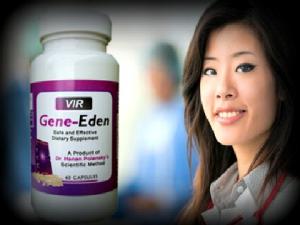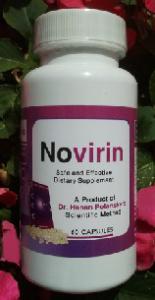Difficulty Swallowing? It Could be Herpes Esophagitis.
Organisms (germs) that cause esophagitis include fungi, yeast, and viruses, such as herpes.
There are many health problems that may result from infectious esophagitis, such as holes in your esophagus, or having the infection spread to other areas.
ROCHESTER, NEW YORK, UNITED STATES OF AMERICA, April 28, 2016 /EINPresswire.com/ -- “Infected with the herpes simplex virus (HSV-1 or HSV-2)? The CBCD recommends taking Gene-Eden-VIR or Novirin against the latent virus.” – Greg Bennett, CBCD— Greg Bennett, CBCD
The herpes simplex virus (HSV) can sometimes cause a condition called herpes esophagitis. According to a recent study, it usually affects men over the age of 62, and it occurs when the immune system is weakened. Dr. Wang and colleagues wrote that “Dysphagia (difficulty or discomfort in swallowing) and odynophagia (pain during swallowing) are the typical symptoms of herpes esophagitis (HE) … the 3 main types of HE are classified and described as follows: small, punched-out lesions with and without raised margins are type I and type II, respectively; multiple confluent ulcers with a map-like appearance is type III.” (1) Additionally, there are often sores in the mouth or back of the throat.
Click to learn more about herpes symptoms.
Medline Plus notes that “Health problems that may result from infectious esophagitis include: Holes in your esophagus (perforations), infection at other sites, (and) recurrent infection.” (2) The Center for the Biology of Chronic Disease (CBCD) recommends that individuals infected with the herpes virus (HSV-1 or HSV-2) take Gene-Eden-VIR or Novirin against the latent herpes virus. The formula of these natural, antiviral products was shown to reduce herpes symptoms in two separate post-marketing clinical studies that followed FDA guidelines. Additionally, the formula was designed to help the immune system target the latent form of the herpes virus.
The formula of Gene-Eden-VIR and Novirin was tested by Hanan Polansky and Edan Itzkovitz from the CBCD. The studies showed that the Gene-Eden-VIR and Novirin formula is effective against the family of herpes viruses, including HSV-1. The clinical studies were published in the peer reviewed, medical journal Pharmacology & Pharmacy, the first, in a special edition on Advances in Antiviral Drugs. Study authors wrote that, “individuals infected with (HSV-1 or HSV-2)…reported a safe decrease in their symptoms following treatment with Gene-Eden-VIR.” (3) The study authors also wrote that, “We observed a statistically significant decrease in the severity, duration, and frequency of symptoms.” (3)
Both products can be ordered online on the Gene-Eden-VIR and Novirin websites, here:
http://www.gene-eden-vir.com
and
http://www.novirin.com
Gene-Eden-VIR and Novirin are natural antiviral dietary supplements. Their formula contains five natural ingredients: Selenium, Camellia Sinensis Extract, Quercetin, Cinnamomum Extract, and Licorice Extract. The first ingredient is a trace element, and the other four are plant extracts. Each ingredient and its dose was chosen through a scientific approach. Scientists at polyDNA, the company that invented and patented the formula, scanned thousands of scientific and medical papers published in various medical and scientific journals, and identified the safest and most effective natural ingredients against latent viruses. To date, Gene-Eden-VIR and Novirin are the only natural antiviral products on the market with published clinical studies that support their claims.
Note: Novirin shares the same formula as Gene-Eden-VIR. The difference between the two is that Novirin has higher quality and more expensive ingredients.
Because there are other organisms that can cause Esophagitis, the CBCD recommends getting tested for the presence of the herpes virus. Other organisms that can cause this condition are candida albicans (a yeast infection), and tuberculosis bacteria.
What treatments are available for herpes infections?
“Two types of antiviral treatments against HSV are available: topical and oral. The treatments include penciclovir, acyclovir, famciclovir, and valaciclovir. However, their effectiveness is limited. For instance, a meta-analysis of five placebo-controlled and two dose comparison studies evaluated the effect of aciclovir, famciclovir or valaciclovir on symptoms. The meta-analysis showed that oral antiviral therapy decreases the duration and the associated pain of an outbreak by merely one day.” (3) There are also the natural supplements Novirin and Gene-Eden-VIR, which have a formula that was designed to help the immune system target the herpes virus when it is in a latent form.
The CBCD reminds the public that Gene-Eden-VIR and Novirin are not a cure. However, two clinical studies, published in peer reviewed medical journals showed that their formula decreases symptoms in infected individuals. Specifically, the formula of Gene-Eden-VIR and Novirin was shown to safely and effectively reduce herpes symptoms. Additionally, it was designed to help the immune system target the latent virus.
“We recommend that individuals who are infected with a latent herpes virus, take Gene-Eden-VIR or Novirin.” – Greg Bennett, CBCD
Find us on Facebook here: https://www.facebook.com/GeneEdenVIR
Follow us Twitter here: @HananPolansky
All orders of these products are completely confidential, and no information is shared or sold to any third party. Privacy is assured.
References:
(1) Wang, Hung-Wei MD; Kuo, Chia-Jung MD; Lin, Wey-Ran PhD; Hsu, Chen-Ming MD; Ho, Yu-Pin MD; Lin, Chun-Jung MD; Su, Ming-Yao MD; Chiu, Cheng-Tang MD; Chen, Kuang-Hua MD "Clinical Characteristics and Manifestation of Herpes Esophagitis: One Single-center Experience in Taiwan" Medicine April 2016 - Volume 95 - Issue 14 - p e3187
(2) U.S National Library of Medicine
https://www.nlm.nih.gov/medlineplus/ency/article/000646.htm
(3) Polansky, H. Itzkovitz, E. Gene-Eden-VIR Is Antiviral: Results of a Post Marketing Clinical Study. Published in September 2013.
http://www.scirp.org/journal/PaperInformation.aspx?PaperID=36101
Greg Bennett
CBCD
585-250-9999
email us here


